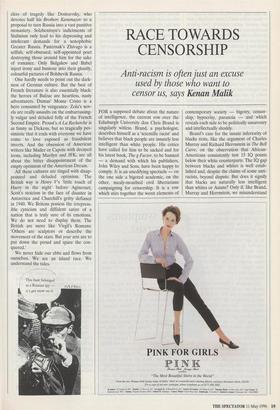RACE TOWARDS CENSORSHIP
Anti-racism is often just an excuse
FOR a supposed debate about the nature of intelligence, the current row over the Edinburgh University don Chris Brand is singularly witless. Brand, a psychologist, describes himself as a 'scientific racist' and believes that black people are innately less intelligent than white people. His critics have called for him to be sacked and for his latest book, The g Factor, to be banned — a demand with which his publishers, John Wiley and Sons, have been happy to comply. It is an unedifying spectacle — on the one side a bigoted academic, on the other, mealy-mouthed civil libertarians campaigning for censorship. It is a row which stirs together the worst elements of contemporary society — bigotry, censor- ship, hypocrisy, paranoia — and which reveals each side to be politically unsavoury and intellectually shoddy.
Brand's case for the innate inferiority of blacks rests, like the argument of Charles Murray and Richard Herrnstein in The Bell Curve, on the observation that African- Americans consistently test 15 IQ points below their white counterparts. The IQ gap between blacks and whites is well estab- lished and, despite the claims of some anti- racists, beyond dispute. But does it signify that blacks are naturally less intelligent than whites or Asians? Only if, like Brand, Murray and Herrnstein, we misunderstand the meaning of intelligence and of race.
Brand holds that IQ tests measure a sin- gle mental entity, called g (for general intelligence), and that this entity is highly heritable. He further argues that high g gives rise to socially desirable behaviours, while low g correlates with social problems such as poverty, unemployment, idleness and illegitimacy.
These are contentious claims. Ever since the Frenchman Alfred Binet invented IQ tests in 1905, there have been fierce debates as to what IQ measures, whether something as polymorphous as human intelligence can be captured by the single entity g, and whether g is anything more than a statistical artefact. Brand dismisses this debate, claiming that intelligence is simply 'that which most mental tests mea- sure'. But this is a tautology: IQ tests mea- sure intelligence, and intelligence is that which IQ tests measure. Such sophistry explains nothing.
If g is, as Brand claims, 'undefinable', then it becomes difficult to substantiate the assertion that g is responsible for social success and racial differences. And if Brand does not know what IQ tests mea- sure, or what intelligence is, how can we evaluate the claim that lower IQ among blacks is an expression of lower intelli- gence?
Brand claims, without presenting any evidence, that 75 per cent of individual dif- ferences in IQ scores are due to genetic factors. There is, in fact, still a consider- able dispute about not just how much, but whether, IQ is heritable. But suppose that IQ is highly heritable — would this show that blacks are innately less intelligent than whites? No, because it is a basic rule of genetics that you cannot compare dif- ferences within a group — in this case IQ scores within the white or the black popu- lation — to differences between groups: IQ differences between blacks and whites. In other words, even if it were true that 75 per cent of IQ differences within the white (or the black) population was inherited, this would tell us nothing about the cause of IQ differences between blacks and whites.
There is, however, considerable data to suggest that IQ scores are in fact not fixed but plastic. Tests conducted by the Ameri- can Army after the second world war revealed that while black Southerners had a lower IQ than white Southerners, black Southerners who had moved to northern cities had a higher IQ than whites who had remained in the South. Other tests have similarly suggested that changes in social conditions can often have a dramatic impact on IQ scores.
The most striking demonstration of IQ plasticity is the so-called Flynn effect, named after James Flynn who discovered the phenomenon. The Flynn effect describes the tendency for a secular rise in IQ levels of about three points every decade. In other words, the average IQ today is some 15 points higher than it was at the end of the second world war. Such a change cannot be the work of genetic fac- tors — the time scale is too short for genes to have had any impact. The most likely explanation is that rising IQ is the result of improved social and nutritional conditions.
Brand also apparently fails to understand modern research on racial differences. Throughout The g Factor, he casually alludes to races as given entities, and seems to think that 'blacks', 'whites' and 'Asians' can easily be distinguished from each other. In ordinary life he would be right. But the everyday idea of race has no place in a supposedly scientific investigation.
No serious biologist now believes that humanity can be divided into distinct races. In recent years, geneticists have shown that there is far greater genetic variation within what we consider to be a race than there is between races. They have shown too that the distribution of one gene (say, that for skin colour) is independent of that for another (say, for blood group). As the geneticist Steve Jones observes, modern biology 'shows that there are no separate groups within humanity (although there are noticeable differences among the peoples of the world)'.
In The Bell Curve, Murray and Herrn- stein acknowledge that racial distinctions are indeed 'blurred' and ask, quite rightly: `What does it mean to be "black" in Ameri- ca, in racial terms, when the word black (or African-American) can be used for people whose ancestry is more European than African? How are we to classify a person who hails from Panama but whose ancestry is predominantly African?' Their answer is to use `self-assessment' — allow people to decide for themselves what race they are. But if the object of the exercise is to investigate an objective relationship between race and intelligence, then using subjective criteria to define a race under- mines the whole project from the start.
There has been one serious study of intelligence which has attempted to resolve the problem of racial classification. Sandra Scarr and Richard Weinberg compared IQ scores of African-American adolescents with blood proteins that indicated the pro- portion of their ancestry that was African and European. They found no relationship between the two. This suggests that the depressed IQ performance of African- Americans is related, not to their biologi- cal heritage, but to the social context of their lives in America. Another study by Scarr and Weinberg which showed that black children in Bermuda performed as well as, and sometimes better than, their white peers in the United States supports this interpretation.
Far from establishing a link between race and intelligence, The g Factor simply regurgitates old arguments long since dis- credited and is replete with methodologi- cal flaws and scientific 'howlers. But are shoddy work and unpalatable conclusions sufficient to ban a book and silence its author? Brand's critics seem to think so. In their arguments for censorship, they show themselves to be as intellectually shallow as Brand himself.
The Scottish Council for Civil Liberties (an organisation which one naively might have assumed would be hostile to censor- ship) called for The g Factor to be banned on the grounds that 'we would not expect `I'm more endangered than you. I haven't even got a shoulder to cry on!' any publisher to knowingly publish an inaccurate or false book'. But how can we establish the distinction between truth and falsehood without intellectual debate and discussion? And what are universities for, if not to teach students how to distinguish between fact and prejudice? It would be a sorry world in which publishers (or univer- sity authorities), rather than readers, were responsible for critically assessing books.
Jim Murphy, of the National Union of Students, suggested that freedom of expression needs to be balanced against the right of black and Asian students to be free from intimidation. This is patron- ising to black and Asian students, treat- ing them as victims unable to stand up for themselves. It also diminishes the true horror of racism. Most black stu- dents have grown up with prejudice and are well prepared for it. Having burning rags stuffed through your letter box is a frightening and intimidating experience. Listening to a psychology lecture — how- ever racist the lecturer may be — is not.
The call for censorship of racist mate- rial is not just wrong in principle. It is, as the journalist Marek Kohn points out, wrong in practice too. 'I believe not only that you can be both against racism and for free expression', argues Kohn, whose book The Race Gallery is an exposé of contemporary racial science, 'but that the only way to counter scientific and related forms of racism is through free expres- sion.' Kohn is right. Those who wish to censor The g Factor seem to believe that such ideas can be kept in check if we do not acknowledge their existence. In fact the opposite is the case. So long as we are not confident enough openly to confront racist ideas, they will fester. Racism can- not be wished away; it must be rooted out and confronted at every turn. Anti-racists today, however, seem so unsure of their own capacity for reasoned argument that they would rather censor an argument than confront and pursue it.
Ultimately censorship could prove far more dangerous than the views of a self- avowed racist like Brand. Most of us have a reflex aversion to racism. Scientific racists are not exactly thick on the ground, dnd Brand's ideas have little purchase, even within his own academic discipline. Censor- ship, on the other hand, is more insidious. It is often introduced, as in the Brand case, under the guise of protecting society from an evil such as racism or anti-Semitism. The motive may be well-intentioned, but the consequences can only be disastrous. Such censorship will ensure that prejudice will flourish unchecked, while at the same time our lives become more regulated and unfree.
Kenan Malik's book, The Race Trap.will be published by Macmillan next month.




































































 Previous page
Previous page